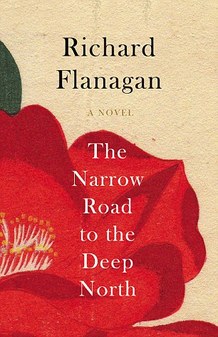
By following the characters on both sides of the conflict into their post-war lives, the novel pushes the reader to question how ordinary life, and love and beauty, can continue after and alongside such extreme acts of human cruelty:
He thought of how the world organises its affairs so that civilisation every day commits crimes for which any individual would be imprisoned for life. And how people accept this either by ignoring it and calling it current affairs or politics or wars, or by making a space that has nothing to do with civilisation and calling that space their private life. (p 389)
Part of the answer to this question is that the perpetrators don’t consider they’re doing anything wrong. Schooled in obedience to the Emperor, determined to achieve the improbable task of constructing a railway line through inhospitable territory with an inadequate workforce and mediaeval tools, believing his prisoners are less than human by dint of having surrendered, the Japanese commander, Nakamura, interprets his slight sense of unease, not as evidence of wrongdoing, but of his inherent goodness and sensitivity:
Watching the prisoner being beaten gave him no pleasure. But what could you do with such people as these? What? Good and gentle parents had raised him as a good and gentle man. And the pain brought on in him by such suffering as he had ordered proved to him how deeply he was a good and gentle man. For, otherwise, why would he feel so pained? But precisely because he was a good man – who understood his goodness as obedience, as reverence, as painful duty – he was able to order this punishment. (p 287)
One of the ironies of the novel is that the title comes from the celebrated Japanese poet, Basho: the best of Japanese culture sitting alongside the worst. The guards are narcissistically proud of their love of poetry:
They recited to each other more of their favourite haiku, and they were deeply moved not so much by the poetry as by their sensitivity to poetry; not so much by the genius of the poem as by their wisdom in understanding the poem; not in knowing the poem but in knowing the poem demonstrated the higher side of themselves and of the Japanese spirit (p 126)
Dorrigo Evans also loves poetry and, albeit his misdeeds pale in comparison to those of the Japanese, his refinement and sensitivity cannot compensate for his repeated betrayals of his marriage. Unlike the Japanese, he does not believe in his own virtue but nevertheless accepts the men’s projections of his leadership qualities as a way of seeing them through their ordeal:
Dorrigo Evans understood himself as a weak man who was entitled to nothing, a weak man whom the thousands were forming into the shape of their expectations of him as a strong man. It defied sense. They were captives of the Japanese and he was the prisoner of their hope. (p 52)
After the war, he tries to shake off the dullness and loneliness of ordinary life in acts of adultery; another survivor of the death camps, Jimmy Bigelow, tries to protect his children through a bizarre obsession with them folding their clothes correctly:
He would beg and plead, he would order and demand and, in the end, exasperated, he would refold and re-stack their clothes himself as they stood by nervously waiting. He would feel some nameless terror that was beyond him to explain – confusion they too would carry with them for the rest of their lives that was both love and fear (p 300)
As the years go by and the gap widens between the memories of the survivors and the official record, others cope by forgetting:
His mind slowly distilled the memory of the POW camps into something beautiful. It was as if he were squeezing out the humiliation of being a slave, drop by drop. First he forgot the horror of it all, later the violence done to them by the Japanese. In his old age he could honestly say he could recall no acts of violence. The things that might bring it back – books, documentaries, historians, he avoided. Then his memory of the sickness and the wretched deaths, the cholera and the beri-beri and the pellagra, that too went; even the mud went, and later so too the memory of the hunger. (p 432-3)
Given that, to my shame, prior to reading this novel my sketchy knowledge of the Death Railway came from the sanitised version in the film The Bridge over the River Kwai, the novel also speaks to me of societal forgetting. But, Richard Flanagan seems to imply, perhaps that’s inevitable: cruel or virtuous, victim or perpetrator, every life is snuffed out in the end.
The Narrow Road to the Deep North is an important, passionate, profound, deeply moving and beautiful novel that, through its multiple strands, explores humanity’s greatest imponderables. Thanks to Chatto and Windus for my review copy. I’m delighted that it’s made the Booker prize shortlist and, if you haven’t read it already, I hope I’ve inspired you to give it a go. You might also be interested in my other posts that touch on some of the themes raised in this novel: identity; memory and forgetting; war; writing about terror, its aftermath, and impact on future generations; the downside of obedience to authority; survival in adversity; camaraderie; teamwork; evil acts perpetrated by supposedly good men.





















 RSS Feed
RSS Feed





















